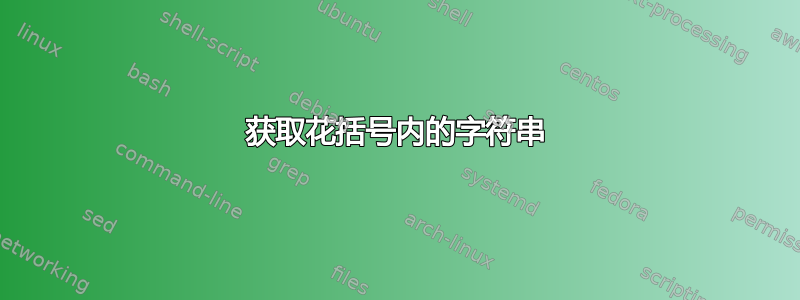
我有一个函数,它接受其他命令的参数。然后我将参数拆分为参数中的第二个命令。现在我需要获取赋予此命令的参数。所以我有一个以花括号开头的字符串,并且在字符串的某个地方它是闭合的。所以我想获取这些花括号之间的这个字符串并将其保存在变量中。例如
\edef\foo{{this is the string I want} This not}
编辑:添加了示例
答案1
\regex_extract_once:nVN可以使用和正则表达式提取文本\{(.+)\}。然后由序列中的第二项给出所需的文本\l_tmpa_seq。
\documentclass[border=6pt]{standalone}
\begin{document}
\edef\foo{{this is the string I want} This not}
\ExplSyntaxOn
\cs_generate_variant:Nn \regex_extract_once:nnN { nVN }
\regex_extract_once:nVN { \{(.+)\} } \foo \l_tmpa_seq
\seq_item:Nn \l_tmpa_seq { 2 }
\ExplSyntaxOff
\end{document}
编辑:下面\extract定义了一个命令来处理用户输入。
\documentclass[border=6pt]{standalone}
\ExplSyntaxOn
\NewDocumentCommand \extract { m }
{
\regex_extract_once:nnN { \{(.+)\} } {#1} \l_tmpa_seq
\seq_item:Nn \l_tmpa_seq { 2 }
}
\ExplSyntaxOff
\begin{document}
\extract{{this is the string I want} This not}
\end{document}
答案2
据我所知,你想要一些比迄今为止建议的答案更简单的东西。
\def\defunwanted#1\foo{\def\unwanted{#1}}
\def\foo#1{%
\afterassignment\defunwanted
\def\wanted#1\foo}
\foo{{this is the string I want} This not}
\show\wanted
\show\unwanted
\bye
显示\wanted是this is the string I want 并且
\unwanted是This not
答案3
您可以使用 来做到这一点expl3。如果作为参数给出的宏的替换文本不以{(显式括号) 开头,则仅??返回 (它可以变成错误消息)。
如果有一个可选参数,一个宏名,则它被定义为包含括号组中的标记。
\documentclass{article}
\ExplSyntaxOn
\NewDocumentCommand{\extractfirstgroup}{om}
{
\jonibue_extractfirst:o { #2 }
\IfValueTF { #1 }
{ \tl_new:N #1 \tl_set_eq:NN #1 \l__jonibue_extractfirst_tl }
{ \tl_use:N \l__jonibue_extractfirst_tl }
}
\tl_new:N \l__jonibue_extractfirst_tl
\cs_new_protected:Nn \jonibue_extractfirst:n
{
\tl_clear:N \l__jonibue_extractfirst_tl
\tl_if_head_is_group:nTF { #1 }
{
\__jonibue_extractfirst:w #1 \q_stop
}
{
??
}
}
\cs_generate_variant:Nn \jonibue_extractfirst:n { o }
\cs_new_protected:Npn \__jonibue_extractfirst:w #1 #2 \q_stop
{
\tl_set:Nn \l__jonibue_extractfirst_tl { #1 }
}
\ExplSyntaxOff
\begin{document}
\newcommand\foo{{this is the string I want} This not}
\newcommand\baz{No group}
\extractfirstgroup{\foo}
\extractfirstgroup[\xyz]{\foo}
\texttt{\meaning\xyz}
\extractfirstgroup{\baz}
\end{document}
答案4
如果我必须在没有 LuaTeX 或 eTeX 扩展且没有 expl3 编程层的传统引擎上执行此操作,也许我会这样做:
\makeatletter
%%=============================================================================
%% PARAPHERNALIA:
%% \UD@firstoftwo, \UD@secondoftwo, \UD@PassFirstToSecond, \UD@Exchange,
%% \UD@removespace, \UD@stopromannumeral, \UD@CheckWhetherNull,
%% \UD@CheckWhetherBrace, \UD@CheckWhetherLeadingExplicitSpace,
%%=============================================================================
\newcommand\UD@firstoftwo[2]{#1}%
\newcommand\UD@secondoftwo[2]{#2}%
\newcommand\UD@PassFirstToSecond[2]{#2{#1}}%
\newcommand\UD@Exchange[2]{#2#1}%
\@ifdefinable\UD@removespace{\UD@Exchange{ }{\def\UD@removespace}{}}%
\@ifdefinable\UD@stopromannumeral{\chardef\UD@stopromannumeral=`\^^00 }%
%%-----------------------------------------------------------------------------
%% Check whether argument is empty:
%%.............................................................................
%% \UD@CheckWhetherNull{<Argument which is to be checked>}%
%% {<Tokens to be delivered in case that argument
%% which is to be checked is empty>}%
%% {<Tokens to be delivered in case that argument
%% which is to be checked is not empty>}%
%%
%% The gist of this macro comes from Robert R. Schneck's \ifempty-macro:
%% <https://groups.google.com/forum/#!original/comp.text.tex/kuOEIQIrElc/lUg37FmhA74J>
\newcommand\UD@CheckWhetherNull[1]{%
\romannumeral\expandafter\UD@secondoftwo\string{\expandafter
\UD@secondoftwo\expandafter{\expandafter{\string#1}\expandafter
\UD@secondoftwo\string}\expandafter\UD@firstoftwo\expandafter{\expandafter
\UD@secondoftwo\string}\expandafter\UD@stopromannumeral\UD@secondoftwo}{%
\expandafter\UD@stopromannumeral\UD@firstoftwo}%
}%
%%-----------------------------------------------------------------------------
%% Check whether argument's first token is an explicit character token
%% of category 1 (begin group):
%%.............................................................................
%% \UD@CheckWhetherBrace{<Argument which is to be checked>}%
%% {<Tokens to be delivered in case that argument
%% which is to be checked has a leading
%% explicit catcode-1-character-token>}%
%% {<Tokens to be delivered in case that argument
%% which is to be checked does not have a
%% leading explicit catcode-1-character-token>}%
\newcommand\UD@CheckWhetherBrace[1]{%
\romannumeral\expandafter\UD@secondoftwo\expandafter{\expandafter{%
\string#1.}\expandafter\UD@firstoftwo\expandafter{\expandafter
\UD@secondoftwo\string}\expandafter\UD@stopromannumeral\UD@firstoftwo}{%
\expandafter\UD@stopromannumeral\UD@secondoftwo}%
}%
%%-----------------------------------------------------------------------------
%% Check whether brace-balanced argument's first token is an explicit
%% space-token:
%%.............................................................................
%% \UD@CheckWhetherLeadingExplicitSpace{<Argument which is to be checked>}%
%% {<Tokens to be delivered in case <argument
%% which is to be checked> does have a
%% leading explicit space-token>}%
%% {<Tokens to be delivered in case <argument
%% which is to be checked> does not have a
%% a leading explicit space-token>}%
\newcommand\UD@CheckWhetherLeadingExplicitSpace[1]{%
\romannumeral\UD@CheckWhetherNull{#1}%
{\expandafter\UD@stopromannumeral\UD@secondoftwo}%
{%
% Let's nest things into \UD@firstoftwo{...}{} to make sure they are nested in braces
% and thus do not disturb when the test is carried out within \halign/\valign:
\expandafter\UD@firstoftwo\expandafter{%
\expandafter\expandafter\expandafter\UD@stopromannumeral
\romannumeral\expandafter\UD@secondoftwo
\string{\UD@CheckWhetherLeadingExplicitSpaceB.#1 }{}%
}{}%
}%
}%
\@ifdefinable\UD@CheckWhetherLeadingExplicitSpaceB{%
\long\def\UD@CheckWhetherLeadingExplicitSpaceB#1 {%
\expandafter\UD@CheckWhetherNull\expandafter{\UD@firstoftwo{}#1}%
{\UD@Exchange{\UD@firstoftwo}}{\UD@Exchange{\UD@secondoftwo}}%
{\expandafter\expandafter\expandafter\UD@stopromannumeral
\expandafter\expandafter\expandafter}%
\expandafter\UD@secondoftwo\expandafter{\string}%
}%
}%
%%-----------------------------------------------------------------------------
%% Extract first inner undelimited argument:
%%
%% \UD@ExtractFirstArgUnbraced{ABCDE} yields A
%%
%% \UD@ExtractFirstArgUnbraced{{AB}CDE} yields AB
%%
%% Due to \romannumeral-expansion the result is delivered after two
%% expansion-steps/after "hitting" \ExtractFirstArgUnbraced with
%% \expandafter twice.
%%
%% \UD@ExtractFirstArgUnbraced's argument must not be blank.
%%
%% Use frozen-\relax as delimiter for speeding things up.
%% I chose frozen-\relax because David Carlisle pointed out in
%% <https://tex.stackexchange.com/a/578877>
%% that frozen-\relax cannot be (re)defined in terms of \outer and cannot be
%% affected by \uppercase/\lowercase.
%%
%% \ExtractFirstArgUnbraced's argument may contain frozen-\relax:
%% The only effect is that internally more iterations are needed for
%% obtaining the result.
%%
%%.............................................................................
\@ifdefinable\UD@RemoveTillFrozenrelax{%
\expandafter\expandafter\expandafter\UD@Exchange
\expandafter\expandafter\expandafter{%
\expandafter\expandafter\ifnum0=0\fi}%
{\long\def\UD@RemoveTillFrozenrelax#1#2}{{#1}}%
}%
\expandafter\UD@PassFirstToSecond\expandafter{%
\romannumeral\expandafter
\UD@PassFirstToSecond\expandafter{\romannumeral
\expandafter\expandafter\expandafter\UD@Exchange
\expandafter\expandafter\expandafter{%
\expandafter\expandafter\ifnum0=0\fi}{\UD@stopromannumeral#1{}}%
}{%
\UD@stopromannumeral\romannumeral\UD@ExtractFirstArgUnbracedLoop
}%
}{%
\newcommand\UD@ExtractFirstArgUnbraced[1]%
}%
\newcommand\UD@ExtractFirstArgUnbracedLoop[1]{%
\expandafter\UD@CheckWhetherNull\expandafter{\UD@firstoftwo{}#1}%
{\expandafter\UD@stopromannumeral\UD@secondoftwo{}#1}%
{\expandafter\UD@ExtractFirstArgUnbracedLoop
\expandafter{\UD@RemoveTillFrozenrelax#1}}%
}%
%%=============================================================================
%% \UDExtractFirstBraceGroup
%% {<tokens in case there is no brace group>}%
%% {<argument where to extract content of 1st brace group>}%
%%
%% In case <argument where to extract content of 1st brace group> does not
%% contain a brace group you get <tokens in case there is no brace group>.
%% Otherwise you get the content of the 1st brace group of the <argument where
%% to extract content of 1st brace group>.
%%
%% Due to \romannumeral-expansion the result can be obtained by triggering
%% two expansions on \UDExtractFirstBraceGroup
%%
%%=============================================================================
\newcommand\UDExtractFirstBraceGroup[2]{%
\romannumeral\UD@ExtractFirstBraceGroupLoop{#2}{#1}%
}%
\newcommand\UD@ExtractFirstBraceGroupLoop[2]{%
\UD@CheckWhetherNull{#1}{\UD@stopromannumeral#2}{%
\UD@CheckWhetherBrace{#1}{%
\expandafter\UD@firstoftwo\expandafter{\expandafter}%
\UD@ExtractFirstArgUnbraced{#1}%
}{%
\UD@CheckWhetherLeadingExplicitSpace{#1}{%
\expandafter\UD@ExtractFirstBraceGroupLoop\expandafter{\UD@removespace#1}%
}{%
\expandafter\UD@ExtractFirstBraceGroupLoop\expandafter{\UD@firstoftwo{}#1}%
}%
{#2}%
}%
}%
}%
%%=============================================================================
\makeatother
\documentclass{article}
\begin{document}
\ttfamily\frenchspacing
\UDExtractFirstBraceGroup{%
Hey, there is no brace group in the string!!!%
}{%
This not {This is the string I want} This not {This not} This not {This not}%
}%
\expandafter\expandafter\expandafter\def
\expandafter\expandafter\expandafter\foo
\expandafter\expandafter\expandafter{%
\UDExtractFirstBraceGroup{%
Hey, there is no brace group in the string!!!%
}{%
This not {This is the string I want} This not {This not} This not {This not}%
}%
}%
\string\foo\space is: \meaning\foo
\edef\bar{%
\UDExtractFirstBraceGroup{%
Hey, there is no brace group in the string!!!%
}{%
This not {This is the string I want} This not {This not} This not {This not}%
}%
}%
\string\bar\space is: \meaning\bar
\bigskip
\hrule
\bigskip
\UDExtractFirstBraceGroup{%
Hey, there is no brace group in the string!!!%
}{%
{This is the string I want} This not%
}%
\expandafter\expandafter\expandafter\def
\expandafter\expandafter\expandafter\bas
\expandafter\expandafter\expandafter{%
\UDExtractFirstBraceGroup{%
Hey, there is no brace group in the string!!!%
}{%
{This is the string I want} This not%
}%
}%
\string\bas\space is: \meaning\bas
\edef\bat{%
\UDExtractFirstBraceGroup{%
Hey, there is no brace group in the string!!!%
}{%
{This is the string I want} This not%
}%
}%
\string\bat\space is: \meaning\bat
\bigskip
\hrule
\bigskip
\UDExtractFirstBraceGroup{%
Hey, there is no brace group in the string!!!%
}{%
This is a string without brace group.%
}%
\expandafter\expandafter\expandafter\def
\expandafter\expandafter\expandafter\bau
\expandafter\expandafter\expandafter{%
\UDExtractFirstBraceGroup{%
Hey, there is no brace group in the string!!!%
}{%
This is a string without brace group.%
}%
}%
\string\bau\space is: \meaning\bau
\edef\bav{%
\UDExtractFirstBraceGroup{%
Hey, there is no brace group in the string!!!%
}{%
This is a string without brace group.%
}%
}%
\string\bav\space is: \meaning\bav
\end{document}





